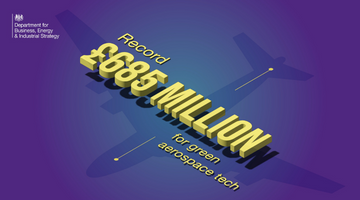
The UK has a proud track record of innovation and research and development in aerospace, and innovative and creative projects will play a big part in decarbonising aviation. Today, the UK Government have announced new funding for the Aerospace Technology Institute (ATI), a key research institution that has led on developing and growing the projects that will lead to greener, cleaner flying.
This was demonstrated plainly last week when the FlyZero programme revealed its findings that liquid hydrogen could offer a realistic way to decarbonise aviation, an important step on the technological journey to a carbon-free aircraft.
What funding has been announced?
The additional funding for the ATI totals £685 million from Government between 2022 and 2025, matched by industry to bring the total investment up to more than £1 billion in that time frame. This funding will be split into £240 million for 2022/23, £250 million for 2023/24 and £195 million for 2024/25.
In addition to the confirmation that the ATI programme will be extended through to 2031, as confirmed at the Budget in October, this is very welcome news that will go a long way to maintaining the UK’s place as a global leader in aerospace research and development.
What does this funding mean?
ATI funding will go to a variety of projects all over the UK that are researching the next generation of aircraft technology. From hydrogen projects such as GKN’s H2GEAR project to ZeroAvia’s HyFlyer II, electric flight projects like Rolls-Royce’s ACCEL or the next generation of manufacturing such as Renishaw’s Large Scale Additive Manufacturing project, previous ATI funding has unlocked talent across the UK to design the technology that will power the future of aviation.
The additional funding – a record amount – will go to support more projects in a wide variety of research topics, supporting tens of thousands of jobs across the economy and adding to the £97 billion that the ATI programme has already contributed to the UK economy.
The work of the Jet Zero Council will also be substantially boosted by the new funding, with a key pillar of the Council being to develop the aircraft technology that will deliver net zero for aviation – aka ‘Jet Zero’ – by 2050.
How can ADS members get involved?
ADS have welcomed the additional funding and would encourage all members working on the next big thing to apply for ATI funding.
The ATI will reveal further information about the application and Expression of Interest process in due course, with more information available on their website at: https://www.ati.org.uk/funding/.
ADS Chief Executive Kevin Craven said:
“This is a major vote of confidence in the UK aerospace industry. The uplift in funding will turbocharge our development of the technology needed to deliver net zero aviation, accelerating progress towards this global ambition.
“Industry match-funding for Government’s investment in the ATI will mean more than £1.3bn available for investment in aerospace R&D over three years, supporting and creating high value jobs in all nations and regions of the UK.
“Aerospace generates UK exports worth billions of pounds a year, and in this technologically advanced sector, R&D investment is vital to maintaining our competitive advantage. The Government’s commitment to the ATI for the decade ahead is set to generate a substantial return on investment for the UK, and enable our innovative large and small companies alike to be world leaders in delivering the future of flight.”





